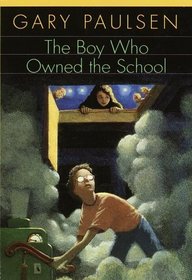Grade 6-8-- Jacob Freisten, thin and freckled, the "ugliest boy in history except for one," according to his own assessment, and a total clod to boot, has perfected the art of near invisibility, of being "there but not there." He leads the kind of exaggeratedly painful life that requires careful timing and planning so he can avoid attracting attention; if people notice him, there's always a comic disaster. He even goofs up in his daydreams. His parents drink too much, his mother is devoted to his sister's blossoming career as a beauty contest winner, and he's close to failing English. His English teacher ropes him into working on the school production of The Wizard of Oz for extra credit, appropriately enough as the understage controller of the fog machine. This gives him an opportunity to work with Maria Tressor, the most perfect girl in the school, on whom he has a rapidly intensifying crush. But it's a mixed blessing. When it's time to fog, Jacob, the consummate timing expert, flubs it badly, and in the confusion he blurts his feelings out to Maria. She says an astonishing yes to his feeble invitation for a date, and romance blooms because, she tells him, he's a winner. This brief, humorous look at adolescent life, complete with distorted self-concept, is a departure from the intensity of much of Paulsen's work, but is no less of a survival story in its own way. The novel is told mostly through a third-person narrative with little conversation until the end, which has the effect of distancing readers; it becomes a gently ironic fable of transformation and first love, in which many readers will find themselves.
Book Reviews of The Boy Who Owned The School
|
|
The Boy Who Owned The School Author:
|




